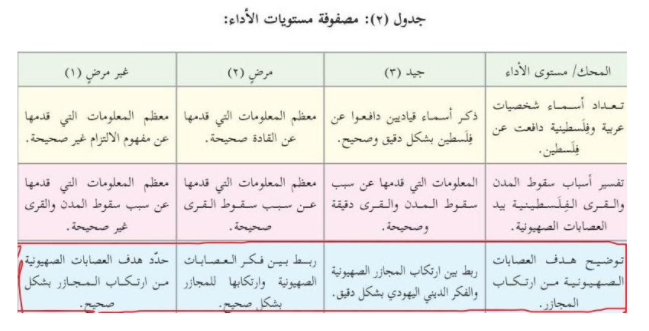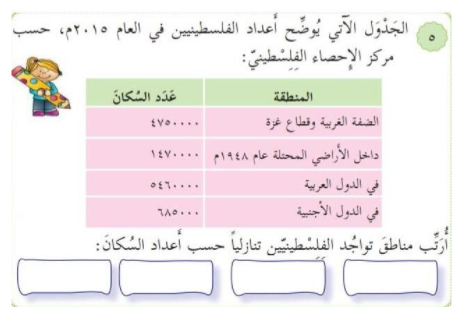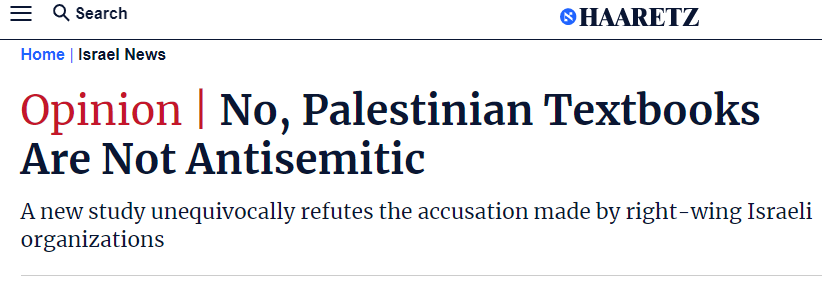Dr. Assaf David, head of the Israeli Forum for Regional Thinking, has published an article in Haaretz, Aug 10, 2021, in which he reviews the recent report by the German Georg Eckert Institute (GEI) on the Palestinian Authority textbooks. In his article, titled “No, Palestinian textbooks are not anti-Semitic” Dr. David tries to stress the findings of the report in light of his anti-occupation ideology. He also laments the floor given to Israeli “conservative” research institutes that influence with their “one-sided” findings policy makers in Europe. Being one of the researchers he probably refers to, I would like to make the following comments:
- In sharp contrast to the article’s title, there is anti-Semitism in the PA textbooks. The teachers’ guides as well show the ways it is inculcated in the students’ minds. Following are 2 examples:
- A verse within a poem in a seventh-grade textbook calls for the liberation of Al-Aqsa Mosque “from the grip of infidelity and the Devil’s aides”. Is it not anti-Semitism?

- A teacher’s guide accompanying a grade-10 history textbook features a student evaluation sheet dealing with three topics. The third one (marked in red) evaluates the student’s ability to “clarify the Zionist gangs’ goal in perpetrating massacres”, with three options: Good (3 points), Satisfactory (2) and Unsatisfactory (1). The student who “defined correctly the Zionist gangs’ goal in perpetrating massacres” gets the unsatisfactory mark. The student who “connected correctly the thinking of the Zionist gangs to their perpetration of massacres” gets the satisfactory mark, and the one who “accurately connected the perpetration of the Zionist massacres to the Jewish religious thinking” gets the highest mark – Good (3). Again, is the pedagogical attempt to channel the student into combining Judaism with massacres not anti-Semitism of the worst kind?

Even the Georg Eckert Institute’s report itself, that tries hard to hide such phenomena in the PA textbooks (the above-mentioned two examples do not appear there), presents a case of anti-Semitic attitude in a PA textbook: “One textbook provides a learning context that displays anti-Semitic motifs” (p. 172).
Dr. David himself eventually admits in his Haaretz article that “examples of anti-Semitism… exist in the Palestinian textbooks but, according to the research team, their scope is limited” (translated from his Hebrew article).
Why, then, is this misleading title of his article?
- The Georg Eckert Institute has found other negative aspects in the Palestinian textbooks, such as questioning the legitimacy of the State of Israel’s existence (pp. 171, 173 in the report) and the approval of violence against Israeli civilians (the Executive Summary p. 4), but it still insists that these books meet UNESCO standards. In view of this and other failings I wonder if this 194-page report is truly professionally scientific. To me it seems highly politicized.
III. Dr. David mentions and praises a former study of both Palestinian and Israeli schoolbooks conducted by Professors Daniel Bar-tal of Tel Aviv University and Sami Adwan of Bethlehem University. That research was grossly biased and I criticized it widely when published (2013). The researchers simply omitted the most extremist Palestinian textbooks (those of religious studies) and added the ultra-religious Haredi textbooks that are not subjected to the Israeli Ministry of Education’s supervision, just to “show” that the two parties are evenly extremist. They also omitted from the list of the study categories the one dealing with peace education (because such items appeared in the Israeli textbooks only). And there were other serious faults in that study I referred to at that time.
- In Dr. David’s view, the Palestinians – being an occupied nation – are fully entitled to express their resistance to the occupier (Israel) in their schoolbooks, so that one should be lenient to expressions of hatred and violence appearing there – contrary to the view of the authors of the GEI report whom he criticizes over that. He just forgets to mention, as a scholar of Middle Eastern studies, the fact that, in Palestinian eyes, the occupation of Palestine started with the very establishment of the State of Israel in 1948, and not in 1967. For those who do not know this, following is an example taken from the Palestinian schoolbooks:
In the following chart in a mathematics textbook that presents the numbers of Palestinians in various areas in the world in 2015, according to the Palestinian Statistics Center, the Palestinian citizens of Israel are classified as living “inside the territories occupied in 1948” (the second pink line):

I think that one must not be naïve and talk about the Palestinians’ right to act against the occupation so long as they mean the territory “from the river to the sea”. Accordingly, one should not justify the hatred and violence expressions against Israel and the Jews that are found in their schoolbooks in the pretext of “the occupation”, as done by Dr. David.
- He further stresses the report’s finding that the PA textbooks “call for tolerance, mercy, forgiveness and justice” but fails to mention that the report specifically states (p. 170) that such pieces refer to the Palestinian society exclusively, with no connection made to Israel or the conflict. Such failure may signify that he did not read the report (or rather the General Conclusion thereof) profoundly enough. I would not be harsh on him and say that he ignored that on purpose.
- To sum up, Dr. Assaf David’s article is, in my view, a pure political statement with no professional values

Dr. Arnon Groiss is an expert on Middle Eastern affairs, having earned his Ph.D. degree from Princeton University’s Department of Near Eastern Studies. He is also a retired journalist, having worked for close to 40 years at the Voice of Israel – Arabic Radio, where he acquired additional experience in this field. Since 2000 he has been studying the attitude to the “other” and to peace in various Middle Eastern curricula, particularly the Palestinian one, and authored numerous reports dealing with this issue, having examined over a thousand schoolbooks and teachers’ guides. Dr. Groiss presented his findings to policy makers at the United Nations, the US Congress, the European Parliament, the British House of Commons, the French Assemblée nationale, the German Bundestag, the Canadian and Swedish parliaments and the Israeli Knesset, as well as to people of the press and in various research institutions.









